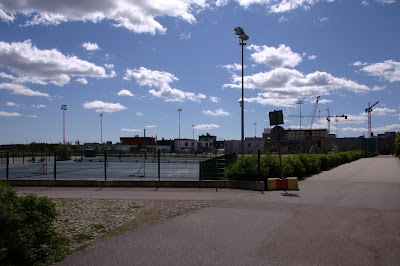A few more pictures now, thought why not since I got some more edited. Here again, there is a clear difference between the descriptions of the story and what the locations look like now. Regarding the first picture: probably the tennis court is not the same but it's to the right direction and there is no other tennis court nearby these days. Maybe it's the same location.
"Tapani lived in Toukola, close to where Koreankatu street departed from Kustaa Vaasa road (map). The easiest route home would have been to turn to Kaironkatu street. But he didn't do so."
"Instead, he sauntered along Hämeentie road towards the city centre, crossed the street by the Arabia factory and then slightly nervously approached the tennis court (map). The court was empty. Tapani was disappointed. Around that time in the afternoon there often were two girls, young women, there, and he liked to hang around to watch them play. He didn't really understand the game much, but he enjoyed the women's graceful movements. Especially he liked the girl whose hair was auburn, almost red."
"Tapani waited for a few minutes, but nobody came. He sighed, stuck his hands into his pockets and, with head sunk in disappointment, started towards Kustaa Vaasa road. This time he didn't even feel like testing how long he could stare at women he passed by. He didn't quite know why the empty court had soured his mood. There was no point to it, really; if the girls had been there, it would've just gone the way it always did. After finishing the game, the auburn-haired girl would have waved at him, smiling; he would've felt like caught doing something bad, would have fled, red spots burning on his cheeks; would have run all the way home. That's what would've happened, and actually it wouldn't have felt any better than the gnawing disappointment. Tapani lifted his head and decided to whistle a cheerful song. Instead, a hymn escaped from his lips. It came out thin and sharp. He didn't know what it was called.
If someone had talked to the people who had passed Tapani then, some might have remembered him. 'Oh, some weird guy?', they would've said. 'Yeah, actually... He had his hands stuck in his pockets and he was whistling some hymn. No, it really was a hymn. Clothes? Not sure... Maybe jeans and some T shirt, maybe green. He was a tallish, gawky sort of a kid, ordinary looking. Had marks on his cheeks, like he'd had a bad acne before. Age? Maybe 20 at most.' That's what people would've said and only because Tapani was whistling while he sauntered slowly towards home."
"It was just over half past four when Tapani came into his home yard. From one hand he was swinging an orange plastic bag, which told that he had gone to a shop. He didn't go straight into the house, badly in need of new paint, but went to the yard and grouched down beside the full rain water barrel. He breathed deep, waited, listened for a moment. A lawnmower was zig-zagging on the other side of the garden fence, the scent of chlorophyll filling the air. Tapani's lips moved. 'Moron. Dimwit moron', he whispered, his words directed at his neighbour who was so obsessive about his lawn and his garden.
He was sure that the scent of the freshly-cut lawn would get his mother to start again on her never-ending complaints about how their yard was the most squalid in the entire street and how he had to do something about it. It annoyed him; he wasn't lazy, didn't even hate garden work - he simply loved his wild and freely flourishing home yard. After nightfall it was teeming with life: the low croaking of frogs in the mossy ditch; rustling and swarming in the grass when mice and voles went off on their excursions; and now in August, the mesmerising orchestra of bush-crickets played until well after midnight."
***
In the next section, night has fallen, and Tapani is about to go out for his nightly excursions.
"For Tapani, Kustaa Vaasa road was a kind of a watershed. On one side of the road was Toukola, his home...
... on the other side Kumpula, an almost identical village of wood houses. This time, Kumpula was drawing him more. There were large, ugly wood buildings there, with suspicious inhabitants: booze sellers, fencers, listless folks lazing in the yards from morning till night, playing cards, with sluggish, loudly laughing women keeping them company.
Tapani was more and more tempted to cross the road, but at the same time some instinct was warning him against it. Just in the past week, he'd had to quickly flee from Kymintie street. He'd done no harm, just peeked through a hole in the hawthorn fence at a woman hanging up laundry, when a gang of ten gypsy kids had tumbled onto the scene. They had surrounded him, kept jumping around him, and he still shivered, remembering how they had chanted in their shrill, loud voices, 'whitey fat face, whitey fat face...'. Tapani swallowed and decided to wait for a sign to decide which way to go. Almost immediately, a hooded crow croaked hoarsely nearby and another responded. Tapani decided that was enough. He was almost relieved when he turned to go towards Old Town."
To be continued...






4 comments:
I love this new series of posts from you. Maybe one day someone will take my (then) published novel and do the same.
xx
AM
Hope your novel does get published, Anne-Marie!!
This is such a great idea Maria. Your photos are breathtaking by the way, so vivid! Is that this new lens? If so, it's fantastic. I really like the excerpts from the book that you are putting with them. It gives such a good image of the broader location too. Really enjoyable! xx
Val, they indeed were taken with the new lens.
Post a Comment